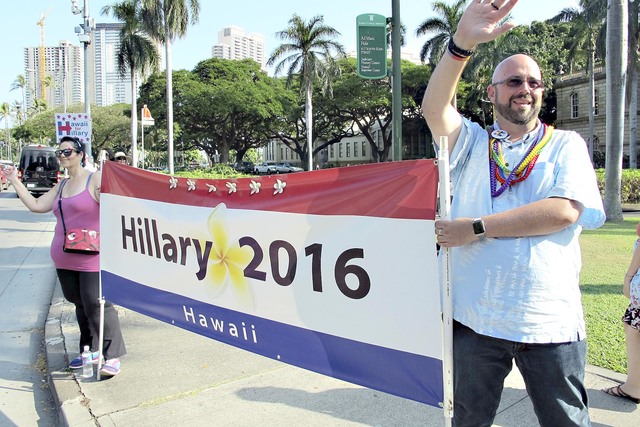Hawaii Democratic Party hopes for strong turnout at caucuses

HONOLULU — Hawaii Democrats will vote for their party’s presidential nominee today, choosing between Bernie Sanders and Hillary Clinton at caucus locations across the state.
ADVERTISING
Sanders’ campaign has focused on income inequality and fair wages, issues that resonate in a state with a high cost of living and comparatively low wages. Sanders wants public colleges and universities to be free, and wants to cut student loan interest rates.
“Not only has he taken strong stances, but he’s also got 30 years of a very consistent message on those that I think resonate well with people,” said Reed Millar, Sanders’ Hawaii campaign director.
Sanders and Clinton also have targeted local issues in Hawaii. Clinton said in a statement she supports Native Hawaiians’ work toward self-determination and nationhood. She also released lists of endorsements organized by ethnic groups, showing strong support from Japanese-American, Filipino-American and Native Hawaiian leaders in the state.
Sanders said self-determination and self-governance will rest in the hands of Native Hawaiians if he’s elected.
“The overthrow of the Kingdom of Hawaii was a shameful act rooted in the type of corporate greed with which we are still too familiar,” the Vermont senator said in a statement.
Clinton visited Kauai in 1992 after Hurricane Iniki and later as secretary of state, working with local officials on issues that affect the Pacific Rim in a state that serves as the U.S. gateway to Asia, said Nam Le, political director for the Clinton for Hawaii campaign.
“She has a great relationship with the people of Hawaii,” Le said. “She understands the issues; she doesn’t need to be briefed on the issues.”
The caucus begins at 1 p.m. Some are concerned a caucus date on the Easter holiday weekend isn’t the best timing, but party leaders expect strong turnout for the competitive election.
“After the Republican caucus, we saw a spike in membership online,” said Stephanie Ohigashi, Hawaii Democratic Party chairwoman. Organizers expect at least the amount of voters as in 2008, when 37,519 ballots were cast.
Representatives from Clinton and Sanders’ teams arrived on the islands in February, and their campaigns came to life here in recent weeks.
An ad running in Hawaii tells the story of Sanders’ father emigrating from Poland and making ends meet with little money. As mayor in Vermont, Sanders set up one of the country’s first affordable housing programs based on communal land trusts. He served in Congress since 1991 as an independent, switching to the Democratic Party in 2015.
Powerful Hawaii Democrats have poured support behind Clinton, including U.S. Sens. Brian Schatz and Mazie Hirono; former Govs. George Ariyoshi and Ben Cayetano; U.S. Rep. Mark Takai; and former U.S. Rep. Colleen Hanabusa.
“From her plan to help veterans struggling with homelessness to her policies that would help families get ahead and stay ahead, Hillary Clinton has shown time and again she is committed to breaking down the barriers that hold us back and to making a real difference in people’s lives,” Ariyoshi said in a statement.
The volume of Clinton endorsements is not worrying Sanders’ campaign.
“A lot of the party establishment has long-standing relationships with Secretary Clinton, and that’s true in states where we’ve won and states where we haven’t won,” Millar said.
Bucking the trend, U.S. Rep. Tulsi Gabbard resigned her post as vice chairwoman of the Democratic National Committee to support Sanders. The Iraq War veteran said her decision was about the country’s need for a commander in chief with the judgment to decide when it’s necessary to use military power and, just as importantly, when it’s not.
Sanders voted against the use of force in Iraq in 2002, while Clinton, then a senator, voted for it.
Sanders was endorsed by the International Longshore and Warehouse Union, which represents about 50,000 workers in several Western states.
Caucus results are expected to be released this evening. Twenty-five of Hawaii’s delegates will be allocated based on a proportion of the vote, while 10 superdelegates will get to vote however they choose.
———————————————-
Here’s a look at how the Democratic caucus works:
IS IT A CAUCUS?
• The state’s Democratic Party calls the caucus a Presidential Preference Poll. It’s similar to a traditional caucus except the votes are done by secret ballot. The Democratic Party of Hawaii pays for the poll, and anyone registered with the party can vote if they are in line at their polling place at 1 p.m. Organizers encourage everyone, especially those not yet registered, to get to their polls early.
WHO’S WHO
• At polling places across the islands, Democrats will choose between the two leading Democratic candidates, Hillary Clinton and Bernie Sanders. Former Maryland Gov. Martin O’Malley suspended his campaign but remains on the ballot with businessman Rocky De la Fuente.
WHEN AND WHERE
• Polling stations open for voters to check their registration at 11 a.m. on Oahu and later on neighbor islands. Anyone who’s in line at 1 p.m. will get to vote, said Stephanie Ohigashi, chairwoman of the Democratic Party of Hawaii. There’s some concern about turnout, since the primary is on a Saturday during Easter weekend.
WHEN WILL WE KNOW?
• Organizers say they hope to have an unofficial tally by 6 p.m. today. Official results are expected about three weeks later.
WHAT’S NEXT
• Hawaii will send 35 delegates to the Democratic National Convention this summer to choose the party’s presidential candidate. Today’s caucus impacts how 25 of those delegates will vote at the convention. Those 25 delegates’ votes will be assigned based on the percentage of the vote candidates received in today’s caucus. The state’s remaining 10 delegates are superdelegates, who are select party leaders and elected officials who can choose whoever they want at the national convention in July.


